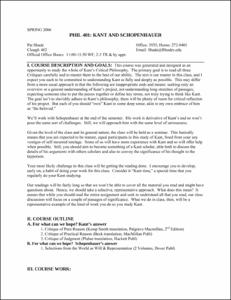Please use this identifier to cite or link to this item:
http://hdl.handle.net/10267/3507Full metadata record
| DC Field | Value | Language |
|---|---|---|
| dc.contributor.author | Shade, Patrick A. | - |
| dc.date.accessioned | 2009-02-26T17:45:33Z | - |
| dc.date.available | 2009-02-26T17:45:33Z | - |
| dc.date.issued | 2006-01-11 | - |
| dc.identifier.uri | http://hdl.handle.net/10267/3507 | - |
| dc.description | This syllabus was submitted to the Rhodes College Office of Academic Affairs by the course instructor. | en_US |
| dc.description.abstract | This course was generated and designed as an opportunity to study the whole of Kant’s Critical Philosophy. The primary goal is to read all three Critiques carefully and to master them to the best of our ability. The text is our master in this class, and I expect you each to be committed to understanding Kant as fully and deeply as possible. This may differ from a more usual approach in that the following are inappropriate ends and means: seeking only an overview or a general understanding of Kant’s project, not understanding long stretches of passages, expecting someone else to put the pieces together or define key terms, not truly trying to think like Kant. The goal isn’t to slavishly adhere to Kant’s philosophy; there will be plenty of room for critical reflection of his project. But each of you should “own” Kant in some deep sense, akin to my own embrace of him as “the beloved.” We’ll work with Schopenhauer at the end of the semester. His work is derivative of Kant’s and so won’t pose the same sort of challenges. Still, we will approach him with the same level of seriousness. Given the level of the class and its general nature, the class will be held as a seminar. This basically means that you are expected to be mature, equal participants in this study of Kant, freed from your any vestiges of self-incurred tutelage. Some of us will have more experience with Kant and so will offer help when possible. Still, you should aim to become something of a Kant scholar, able both to discuss the details of his arguments with others scholars and also to convey the significance of his thought to the layperson. Your most likely challenge in this class will be getting the reading done. I encourage you to develop, early on, a habit of doing your work for this class. Consider it “Kant time,” a special time that you regularly do your Kant studying. Our readings will be fairly long so that we won’t be able to cover all the material you read and might have questions about. Hence, we should take a selective, representative approach. What does this mean? It means that while you should read the entire assignment and seek to understand all that you read, our class discussion will focus on a couple of passages of significance. What we do in class, then, will be a representative example of the kind of work you do as you study Kant. | en_US |
| dc.language | English(United States) | - |
| dc.language.iso | en_US | en_US |
| dc.publisher | Memphis, Tenn. : Rhodes College | en_US |
| dc.relation.ispartofseries | Syllabi CRN | en_US |
| dc.rights | Rhodes College owns the rights to the archival digital images in this repository. Images are made available for educational use only and may not be used for any non-educational or commercial purpose. Approved educational uses include private research and scholarship, teaching, and student projects. For additional information please contact archives@rhodes.edu. Fees may apply. | - |
| dc.subject | Philosophy, Department of | en_US |
| dc.subject | Syllabus | en_US |
| dc.subject | Curriculum | en_US |
| dc.subject | Academic departments | en_US |
| dc.subject | Text | en_US |
| dc.subject | 2006 Spring | en_US |
| dc.title | PHIL 401-01, Kant and Schopenhauer, Spring 2006 | en_US |
| dc.type | Syllabus | en_US |
| Appears in Collections: | Course Syllabi | |
Files in This Item:
| File | Description | Size | Format | |
|---|---|---|---|---|
| 2006_sp_PHIL_401-01.pdf | 108.32 kB | Adobe PDF |  View/Open |
Items in DSpace are protected by copyright, with all rights reserved, unless otherwise indicated.